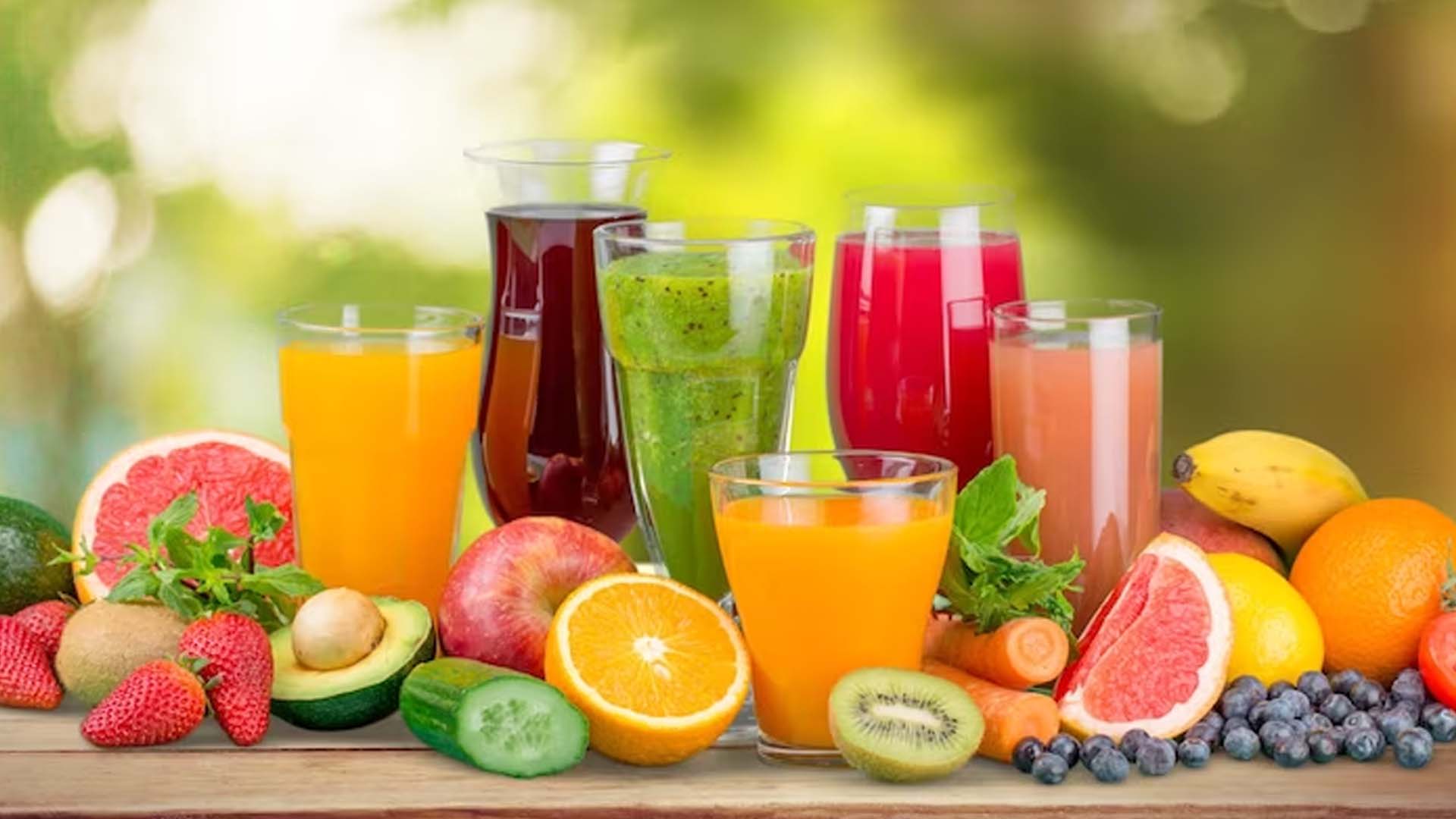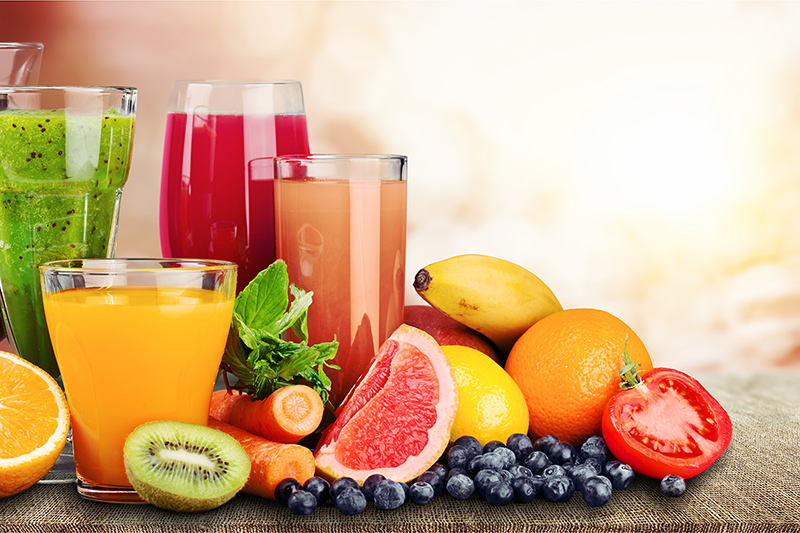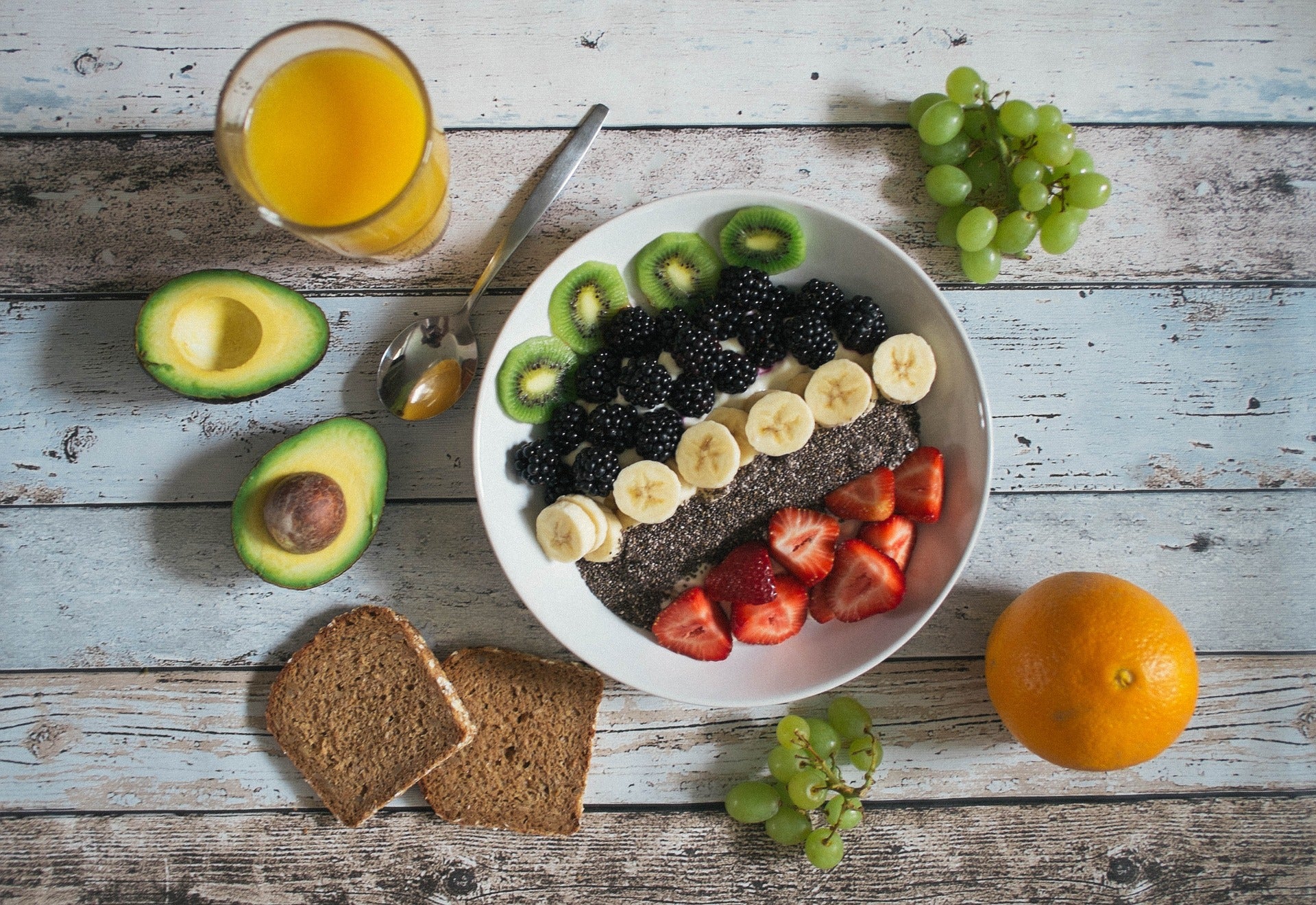Exercise Daily – In the world of nutrition, the debate between fruit and fruit juice has been simmering for quite some time. Both offer sweet, tantalizing flavors that can satisfy your thirst and sugar cravings. But regarding health, which one deserves a place on your plate? Let’s delve into the nutritional showdown between nature’s bountiful fruits and their liquid counterparts: Which is Better for You: Fruit or Fruit Juice? A Nutrition Comparison. Both seem like excellent choices regarding satisfying your sweet tooth and getting essential nutrients, fruit, and juice. But which one is truly better for your health?
Nutritional Value of Whole Fruits
Whole fruits are nutritional powerhouses offering essential vitamins, minerals, and dietary fibre. Here’s a closer look at the remarkable nutritional value they provide:
1. Fiber Content
Dietary fiber is a standout feature of whole fruits. It’s divided into two categories: soluble and insoluble fiber, both beneficial for health.
i. Soluble Fiber
The soluble fiber in fruits like apples, oranges, and berries dissolves in water, forming a gel-like substance in your digestive tract. This fiber helps lower cholesterol levels and stabilize blood sugar levels, making it a valuable ally in the fight against heart disease and diabetes.
ii. Insoluble Fiber
Insoluble fiber, on the other hand, doesn’t dissolve in water. It adds bulk to your stool, aiding regular bowel movements and preventing constipation. Fruits like kiwi and grapes are excellent sources of insoluble fiber.
2. Vitamins and Minerals
Whole fruits are rich in vitamins and minerals, each with its own unique health benefits:
i. Vitamin C
Vitamin C, ascorbic acid, is abundant in fruits like oranges, strawberries, and guavas. It plays a pivotal role in boosting your immune system, promoting healthy skin, and aiding in wound healing.
ii. Potassium
Potassium is vital for maintaining proper blood pressure and heart health. Bananas and avocados are particularly high in potassium, making them excellent choices for keeping your heart in shape.
iii. Antioxidants
Fruits are loaded with antioxidants, such as flavonoids and polyphenols. These compounds help protect your cells from damage caused by free radicals and may reduce the risk of chronic diseases.
3. Natural Sugars
While fruits contain natural sugars like fructose, these sugars come bundled with fiber, vitamins, and minerals. The fiber content in whole fruits slows down sugar absorption, preventing the sudden spikes in blood sugar levels associated with added sugars in processed foods.
4. Low in Calories
Most whole fruits are low in calories, making them an ideal choice for those watching their calorie intake. They provide a satisfying and nutritious snack without the guilt.

Benefits of Fruit Juice
Fruit juice, often lauded for its refreshing taste, also offers several advantages, making it a popular beverage choice. Here are the key benefits of consuming fruit juice:
1. Convenience
One of the most apparent benefits of fruit juice is its convenience. It’s a quick and hassle-free way to enjoy the flavors and nutrients of various fruits. Whether you’re in a rush in the morning or need a swift energy boost during the day, a glass of fruit juice can be a time-saving solution.
2. Hydration
Fruit juices can contribute to your daily hydration needs. Many fruits have high water content; when juiced, this liquid becomes readily available for your body. This is especially beneficial on hot days when you must stay adequately hydrated.
3. Nutrient Intake
Fruit juices provide a concentrated source of essential vitamins and minerals. Depending on the fruits used, you can get a significant dose of nutrients like vitamin C, potassium, and folate in just one serving. These nutrients are crucial for various bodily functions, including immune support and electrolyte balance.
4. Antioxidants
Fruit juices often contain antioxidants, which help combat oxidative stress and reduce the risk of chronic diseases. Antioxidants like flavonoids and polyphenols, found in many fruits, can be present in juice, offering potential health benefits.
5. Variety of Flavors
Fruit juices come in a wide range of flavors, allowing you to explore different taste sensations. From classic orange juice to exotic blends like pineapple-mango, there’s a juice for every palate preference.
6. Post-Exercise Recovery
Some athletes and fitness enthusiasts turn to fruit juices after intense workouts. The natural sugars in fruit juice can help replenish glycogen stores, aiding recovery and refueling energy levels.
7. Versatility in Culinary Uses
Fruit juices aren’t limited to just sipping. They can be used in cooking and baking, adding depth of flavor to sauces, marinades, and desserts. Additionally, they can serve as a base for smoothies and cocktails.
8. Digestive Benefits
Certain fruit juices, like prune juice, are known for their digestive benefits. Prune juice, in particular, is often used to alleviate constipation due to its natural laxative effect.
9. Enjoyment for All Ages
Fruit juice is a hit with people of all ages, making it an accessible way to introduce young children to the flavors of fruits and encourage healthy eating habits.

Drawbacks of Fruit Juice
While fruit juice offers convenience and a burst of fruity flavor, it also comes with several drawbacks you should be aware of. Here are some of the key disadvantages of consuming fruit juice:
1. Added Sugars
One of the most significant drawbacks of many commercial fruit juices is the presence of added sugars. Manufacturers often include high amounts of sugar or fructose corn syrup to enhance flavor and sweetness. Excessive sugar consumption is linked to weight gain, increased risk of type 2 diabetes, and dental problems.
2. Lack of Fiber
Unlike whole fruits, fruit juices lack the dietary fiber found in the pulp and skin of fruits. Fiber plays a crucial role in digestion and helps regulate blood sugar levels. Without fiber, the natural sugars in fruit juice are absorbed more rapidly, potentially causing energy spikes and crashes.
3. Calorie Concentration
Fruit juices can be calorie-dense, providing many calories in a small serving. This can be problematic if you’re trying to manage your calorie intake, as it’s easy to consume more calories than you realize when drinking juice.
4. Potential for Overconsumption
Due to their liquid form, fruit juices are less filling than whole fruits. This can lead to overconsumption of calories and sugar. People may drink larger quantities of juice than they would eat whole fruits, unknowingly increasing their calorie and sugar intake.
5. Limited Nutrient Variety
While fruit juices offer vitamins and minerals, they often lack a diverse range of nutrients in whole fruits. For example, the skin of fruits contains additional nutrients and antioxidants that are absent in juice. Relying solely on fruit juice may lead to nutrient deficiencies over time.
6. Impact on Blood Sugar
Fruit juices can cause rapid spikes in blood sugar levels due to their high sugar content and lack of fibre. This can be problematic for individuals with diabetes or those trying to maintain stable blood sugar levels.
7. Dental Health Concerns
The acidity and sugar content of fruit juices can contribute to dental problems, such as tooth decay and enamel erosion. It’s important to rinse your mouth with water after consuming fruit juice and practice good oral hygiene.
8. Loss of Satiety
Drinking fruit juice may not provide the same fullness and satisfaction as eating whole fruits. This can lead to increased snacking and a higher overall calorie intake.
9. Quality Concerns
Not all fruit juices are created equal. Some commercial juices may contain preservatives, artificial colours, and additives that can harm health. Reading labels and choosing 100% pure fruit juice without additives is essential.
Benefits of Fruit for Athletes
Fruits offer athletes a wide range of benefits due to their nutritional composition. Here are some of the key advantages:
- Natural Source of Carbohydrates
Fruits are rich in natural sugars and carbohydrates, providing a quick and easily digestible energy source. This is particularly beneficial for athletes before and during exercise to maintain energy levels.
2. Antioxidants
Many fruits contain antioxidants, such as vitamin C, E, and phytonutrients. Antioxidants help reduce oxidative stress and inflammation resulting from intense physical activity and contributing to muscle damage.
3. Hydration
Fruits like watermelon, oranges, and berries have a high water content, helping to keep athletes hydrated. Proper hydration is essential for optimal athletic performance and recovery.
4. Fiber
Fruits contain dietary fiber, which aids in digestion and helps regulate blood sugar levels. This can be particularly important for endurance athletes who require sustained energy.
5. Vitamins and Minerals
Fruits are rich in essential vitamins and minerals like potassium, magnesium, and vitamin C. These nutrients are crucial in muscle function, electrolyte balance, and overall health.
6. Digestive Health
The fiber in fruits can support healthy digestion, preventing issues like constipation, which can be uncomfortable for athletes.
7. Immune Support
The vitamins and antioxidants in fruits can boost the immune system, which is important for athletes at a higher risk of illness due to their intense training routines.

Whole Fruit vs. Juice: The Verdict
When choosing between whole fruits and fruit juice, it’s essential to weigh the pros and cons to make an informed decision that aligns with your health goals. Let’s break down the verdict on which option is better for you:
1. Weight Management
Whole Fruits: If you’re concerned about weight management or loss, whole fruits are the better choice. Their high fiber content provides a sense of fullness, reducing the likelihood of overeating. Plus, chewing whole fruits can be more satisfying, helping curb snack cravings.
Fruit Juice: While delicious and convenient, fruit juice is calorie-dense and lacks the satiety-inducing fiber in whole fruits. Too much fruit juice can contribute to a calorie surplus, potentially hindering weight management efforts.
2. Health Conditions
Whole Fruits: For individuals with diabetes or those trying to manage their blood sugar levels, whole fruits are generally the safer option. The fiber in whole fruits slows down the absorption of sugar, preventing sharp spikes in blood glucose.
Fruit Juice: Fruit juices can rapidly increase blood sugar due to their high sugar content and lack of fiber. If you have diabetes or other blood sugar concerns, it’s best to consume fruit juice in moderation and monitor its impact on your blood sugar levels.

Tips for Choosing Wisely
When selecting between whole fruits and fruit juice or choosing the right fruit juice, making informed decisions to maximize nutritional benefits while minimizing potential drawbacks is essential. Here are some valuable tips to help you choose wisely:
1. Reading Labels
For Fruit Juice:
- Look for 100% pure fruit juice without added sugars or artificial sweeteners. The ingredient list should list only the fruit(s) used in the juice.
- Avoid fruit drinks or cocktails containing added sugars, high fructose corn syrup, or artificial flavors.
- Check for labels like “unsweetened” or “no added sugars” to ensure you get the most natural and healthy option.
2. Portion Control
For Both Whole Fruits and Fruit Juice:
- Pay attention to portion sizes. A serving of fruit juice is typically smaller than you might think, usually around 4-6 ounces.
- When consuming whole fruits, be mindful of portion sizes to manage calorie intake if you’re watching your weight.
3. Homemade Juices
For Fruit Juice:
- Consider making your fruit juices at home using a juicer or blender. This way, you can control the ingredients and avoid added sugars.
- Experiment with different fruit combinations to create unique and flavorful juices.
4. Balance Your Diet
For Both Whole Fruits and Fruit Juice:
- Aim for a balanced diet that includes a variety of fruits, vegetables, whole grains, lean proteins, and healthy fats.
- Don’t rely solely on fruit juice for your fruit intake; incorporate whole fruits into your diet to benefit from their fiber content and diverse nutrients.
5. Dilution
For Fruit Juice:
- If you find fruit juice too concentrated or sweet, consider diluting it with water to reduce sugar content while enjoying the flavor.
6. Fresh and Seasonal
For Both Whole Fruits and Fruit Juice:
- Opt for fresh, seasonal fruits when possible. They are often at their peak flavor and nutritional value.
- Local farmers’ markets can be a great source of fresh, seasonal produce.
7. Moderation
For Fruit Juice:
- Enjoy fruit juice in moderation. While it can be a tasty and convenient choice, excessive consumption can lead to an overabundance of sugar and calories.
- Reserve fruit juice as an occasional treat rather than a daily staple in your diet.
Conclusion
So, which is better for you: whole fruits or fruit juice? The answer depends on your goals and dietary needs. If you’re seeking convenience and hydration, fruit juice may be the way to go. However, whole fruits are the clear winner if you prioritize weight management and overall health. Make your choice wisely, and remember that moderation is key in any healthy diet.
FAQs – Which is Better for You: Fruit or Fruit Juice?
Q1. Can I replace whole fruits with fruit juice entirely?
While occasional fruit juice consumption is fine, it’s best to primarily rely on whole fruits for your daily fruit intake to benefit from their fiber content.
Q2. Are there any health benefits unique to fruit juice?
Fruit juice can offer quick hydration and a dose of vitamins, but whole fruits provide a broader range of nutrients and health benefits.
Q3. How can I make sure I’m buying healthy fruit juice?
Check the label for 100% pure juice with no added sugars or artificial ingredients.
Q4. Can fruit juice be a part of a weight loss plan?
In moderation, yes. However, whole fruits are generally more effective for weight management due to their fiber content.
Q5. Are there any fruits that are better consumed as juice?
Some fruits, like oranges and grapefruits, are commonly consumed as juice, but eating them whole is still beneficial for added fiber.






